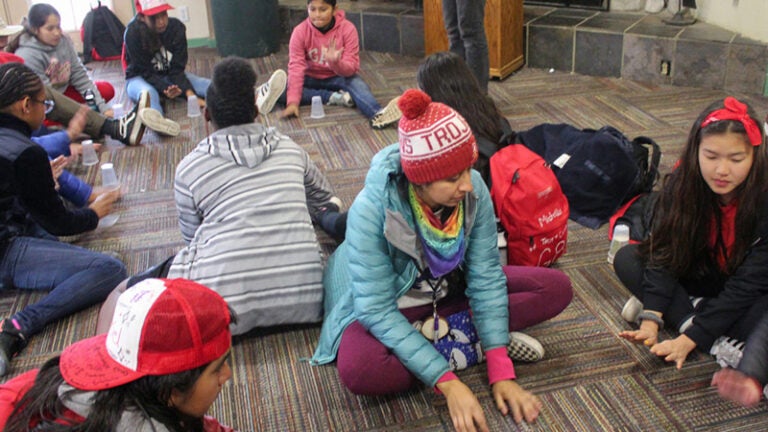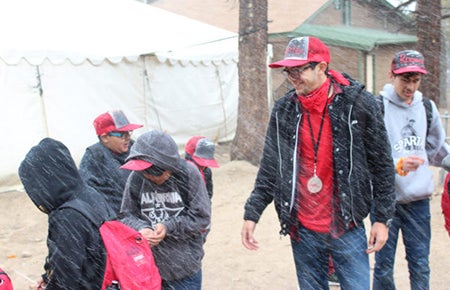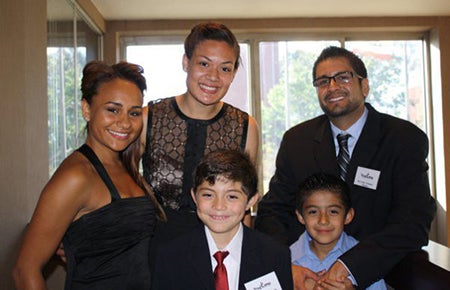
Troy Camp kids return to forest years later — as USC students
Few things have changed Andrew Oropeza’s life as much as Troy Camp.
A shy kid, he often spent recess at John W. Mack Elementary School buried in a book. The weeklong trip into the mountains with the popular USC student-run camp and mentorship initiative helped him come out of his shell.
Troy Camp counselors also tutored him and gave him advice on SAT prep and college applications. He gained practical skills through Troy Camp’s high school leadership program, like getting his driver’s license and learning how to open a bank account and save money.
And he developed a desire to help others, inspired by seeing how counselors rallied their campers to lift the spirits of a friend who was feeling homesick.
“I realized everyone needs a helping hand every once in a while. That’s one of the big reasons I wanted to go to USC, to come back to Troy Camp and be a counselor to kids who are in the shoes I used to be in,” Oropeza said. “I definitely wanted more responsibility, but even more than that, I wanted to be a part of the magic of camp.”
Now a rising sophomore majoring in narrative studies at USC Dornsife College of Letters, Arts and Sciences, he returned to Troy Camp this summer as a volunteer counselor. He’s one of a handful of Los Angeles children who thrived in the mentorship program and, after getting into USC, committed themselves to repaying the favor as camp counselors.

Narrative studies major Andrew Oropeza shares a new experience with his Southern California campers: snow! (Photo: Malika Mohan.)
They are powerful role models who bond with their campers over shared experiences and empower them to dream big about their future.
“That’s the key component of these success stories, that mentoring is happening everywhere in Troy Camp. That’s the special sauce of how all this works,” said former counselor Celso Delgado Jr., who graduated from USC Dornsife with a degree in sociology in 2003. He is now one of Troy Camp’s faculty advisors and associate professor of clinical occupational therapy at the USC Mrs. T.H. Chan Division of Occupational Science and Occupational Therapy.
Troy Camp helps thousands of kids
What started more than 70 years ago as a weeklong trip to the forest for elementary school kids from USC’s neighborhood has grown into something much bigger. Now campers receive academic and mentoring support throughout the year as they progress into middle and high school. Thousands of children have made lifelong friends and gained confidence in their abilities through the program, which is provided to them at no cost.
Oropeza credits much of his academic success to the leadership training and tutoring support he got as a camper and junior counselor in Troy Camp.

Oropeza, front center, attended Troy Camp as a kid when USC Dornsife alumnus Celso Delgado Jr. was a camp counselor. Now Oropeza is a cabin counselor, and Delgado Jr. is a camp faculty advisor. (Photo: Courtesy of Celso Delgado Jr.)
He grew up across the street from the University Park campus. When his elementary school let students wear college shirts on Mondays, he would represent the Trojans in cardinal and gold.
“It wasn’t just any college. It was USC,” he said. “USC was the goal, and that’s what kept me motivated all these years.”
He gained important skills like learning how to handle stress and prepare for high school through Troy Camp’s middle school program, Leaders in Training. As a high school student at James A. Foshay Learning Center, Oropeza got help from counselors with his college applications, along with tips on public speaking and interviews.
When he announced his acceptance to USC online, he got a flood of congratulatory calls and texts from former counselors and campers. There was never any question he’d enroll as a Trojan, and applying to be a Troy Camp counselor was the first item on his to-do list last fall.
He wants to make sure the next generation of local kids has the same magical and inspiring experience he had years ago.
“If I can sum up Troy Camp in one word, it would definitely be opportunity,” Oropeza said. “It leads to so many great things for the kids, but also for the counselors. Everyone gets so much out of it, and it’s such a force for good that we need here in Los Angeles.”